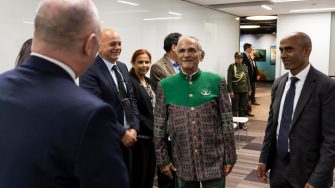UNSW hosts Timor-Leste President for discussions on water, food and health
The President of Timor-Leste, His Excellency José Ramos-Horta, visited UNSW to meet with senior leadership and students.
The President of Timor-Leste, His Excellency José Ramos-Horta, visited UNSW to meet with senior leadership and students.

On Tuesday 8 October, the President of Timor-Leste, His Excellency José Ramos-Horta, visited UNSW to meet with senior leadership and participate in a range of forums and discussions. UNSW Dean of Engineering Professor Julien Epps chaired a session on Water, Food and Health in Timor-Leste, which aligned with Timor-Leste government objectives and priorities.
The session was an opportunity for UNSW representatives to listen to the President and the Timor-Leste delegation on the progress of the government objectives under the Program of the IX Constitutional Government, and for UNSW experts to provide updates on developments since a UNSW delegation last visited Timor-Leste in August 2023 facilitated by UNSW’s Institute for Global Development.
Professor Epps said, “Our visit last year, led by my colleague Professor Foster, inspired us and with a determination to work with, learn from and share in the important work of your government, universities and organisations and people of Timor-Leste.”
The Program of the IX Constitutional Government prioritises resilience-building in regional communities, and food and nutrition security projects are playing an important role. UNSW experts have developed relationships with the National University of Timor-Leste, Dili Institute of Technology, Permatil, and the UN FAO to on projects that include collecting evidence for the efficacy of spring restoration, developing catchment yield models, measuring community-level food and water insecurity experiences, establishing pathways for food quality and safety testing, and improving nutrition.
Former UNSW Dean of Engineering Professor Stephen Foster, who led the UNSW delegation in 2023, was invited to moderate the session. Addressing the President and the Timor-Leste delegation, he said, “Hopefully we can assist in some way in your Government’s various initiatives in food and nutrition security projects to improve population health, as well as strengthen the public health systems and community led water security projects necessary to build a healthy, resilient regional population as a precursor to improved education and economic opportunities.”
UNSW Engineering Deputy Dean (Societal Impact and Translation) Professor Rita Henderson also had the opportunity to update participants on collaboration between UNSW and universities in Timor-Leste, including the National University of Timor-Leste (NUTL) and Dili Institute of Technology (DIT).
She noted, “I am pleased to report that we now have university-wide Memorandum of Understandings in place with both these universities. There are four key themes covered within the MOU including staff exchange, student mobility, co-operative research and the exchange of academic materials.”
Speaking on the topic of the potential engagement on health, nutrition and food, updates from UNSW were provided by Professor Rebecca Ivers, eidemiologist from UNSW Medicine and Health; Professor Jacqui Webster from The George Institute for Global Health; Professor Jayashree Arcot from the Food and Health Group in the School of Chemical Engineering; and Jian Zhao from the Food Science and Technology Group in the School of Chemical Engineering.
On the topic of aquaculture for protein, updates were provided by Professor Jes Sammut from the School of Biological, Earth and Environment Sciences; and Professor Cordelia Selomulya from the Future Food Systems CRC. Dr Philippa Higgins from the School of Civil and Environmental Engineering also spoke about her work with Permatil on satellite image analysis.
President Ramos-Horta also had the opportunity to meet seven UNSW students set to visit Timor-Leste from 16-28 October for the Perma-Youth Camp in Emera. Designed by Permatil in collaboration with local groups, communities and Elders from across the country, Perma-Youth camps equip young people with the knowledge, skills, capacity and confidence to significantly improve rural livelihoods through environmental rehabilitation, water and food resilience, and climate mitigation and adaptation strategies.
UNSW Global Water Institute Director Professor Greg Leslie said, “It was wonderful that the engineering students that travel to Timor Leste later this month to participate in the Permatil Youth had the opportunity to meet President Ramos-Horta during his visit to Australia.”
“The students will also visit the University of Timor-Leste and Dili Institute of Technology in the first of what we hope will be many interactions that develop into cross-university student projects with numerous exchange opportunities in following years,” said Prof Leslie.
The Water, Food and Health session concluded with a guided tour of the Living Water Exhibition at the UNSW Library—a celebration of 75 years of water research that reflects and reaffirms UNSW’s commitment to the stewardship of the planet’s marine, freshwater and urban water ecosystems.
UNSW and the President’s office are continuing to work together to identify gaps where the University can provide strategic support for aquaculture and water security.